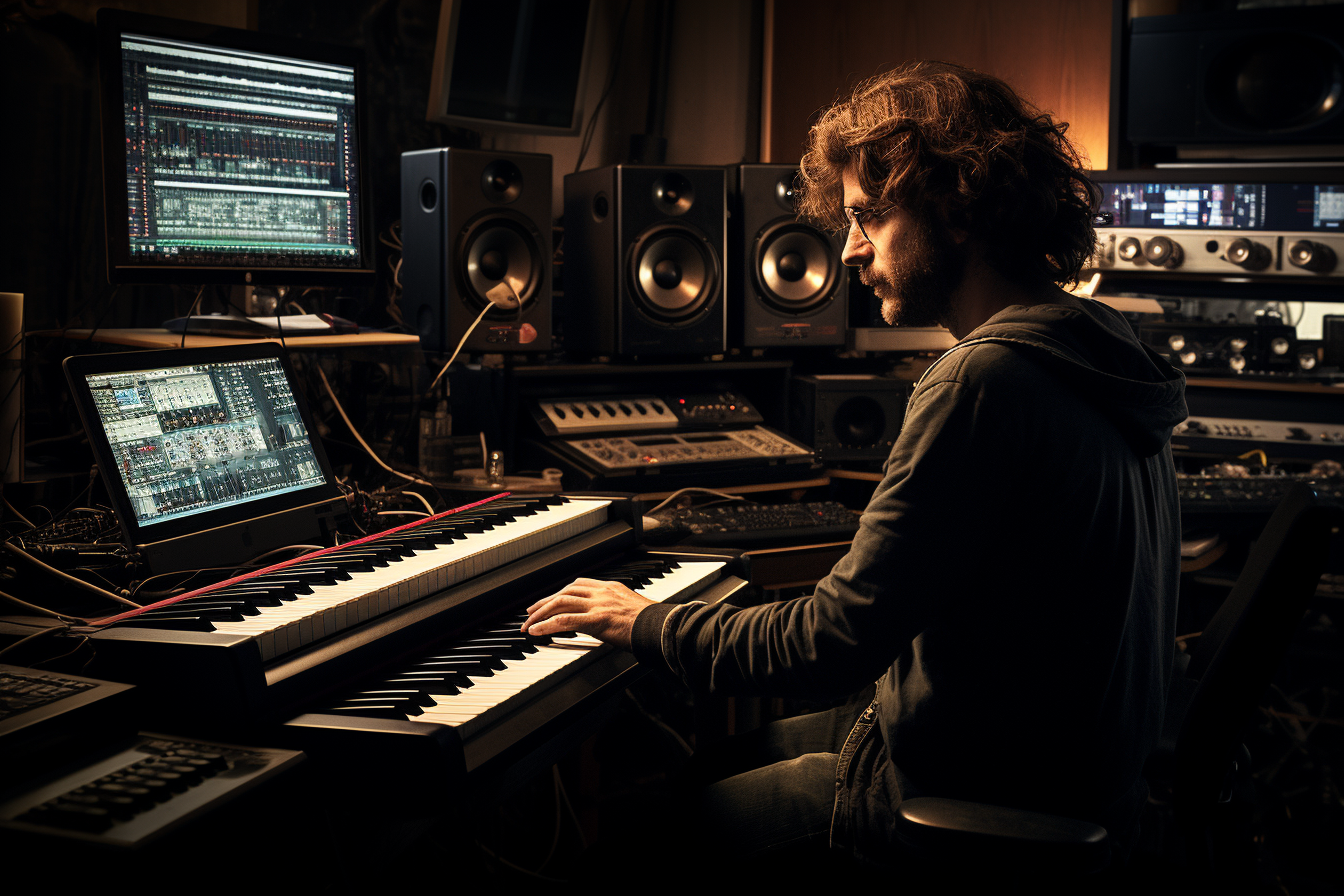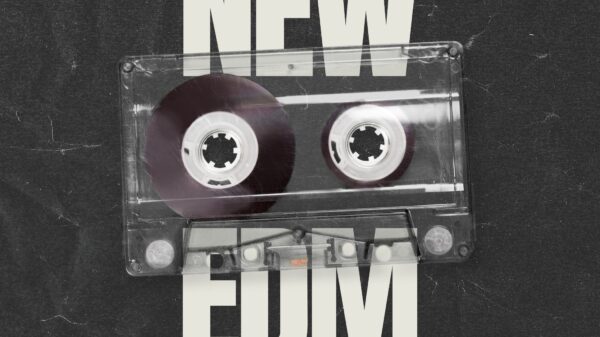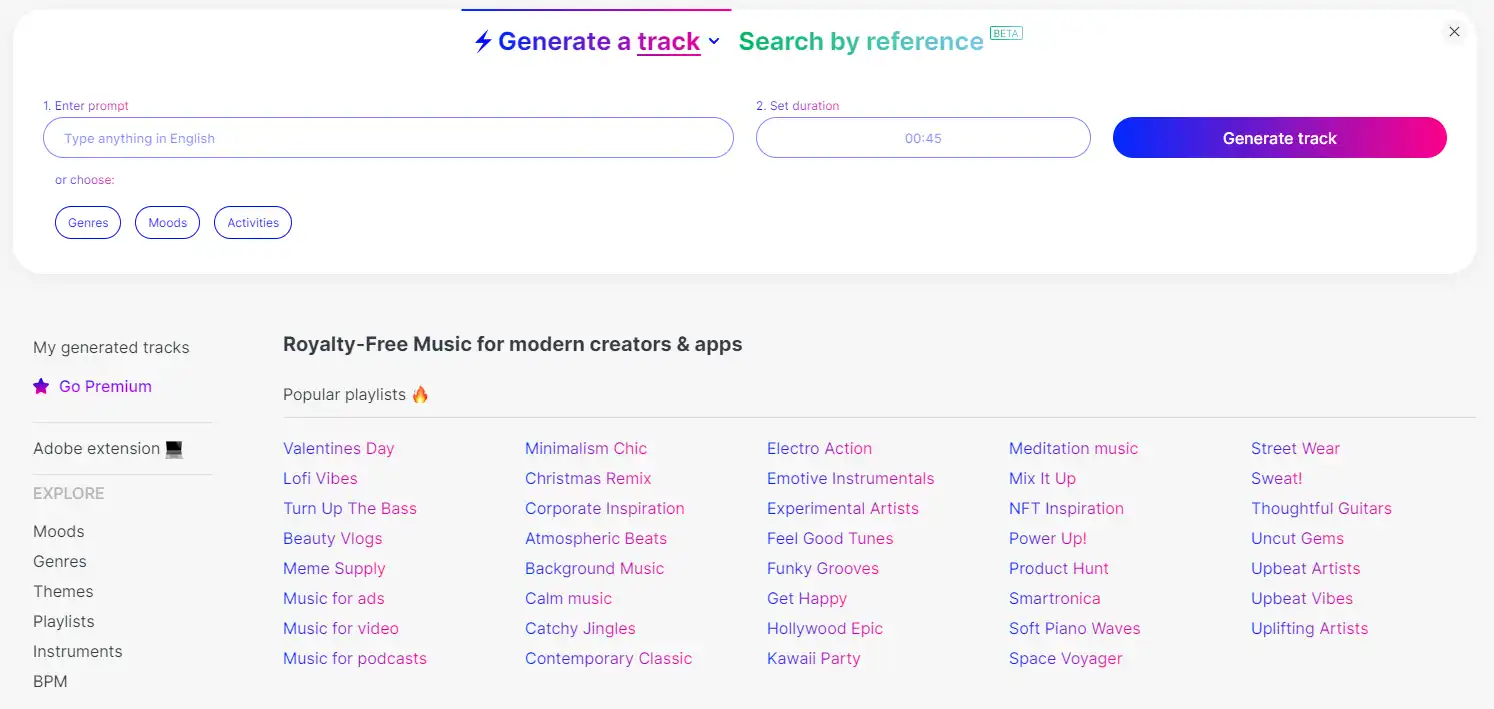Artificial intelligence has made remarkable progress in generating music autonomously. Several music tech companies now offer AI composition platforms that can output royalty-free, original music in virtually any genre and style for creatives and businesses.
This guide provides an overview of the leading AI music composers and evaluates their key capabilities, ideal use cases, and limitations.

How AI Music Composers Work
AI music platforms typically employ complex machine learning algorithms trained on vast datasets of existing music to understand musical structures, patterns, styles and emotional cues.
The trained models can then generate unique melodies, harmonies, rhythms and complete instrumental tracks from scratch based on certain configured parameters like genre, mood, instruments, length, etc.
The AI composes an original piece audibly similar to human-created music. Users can customize outputs and receive fresh, authentic sounding tracks in various formats like MP3 instantly.
Let's explore some of the top AI music composition platforms available today.
Best AI Music Composers
Mubert
Mubert Render makes original and royalty-free music for your content
Overview – Mubert is an advanced AI platform that generates royalty-free music for creators on demand.
Key Features
- Create original music in any genre and mood
- Fine-tune length, tempo, instruments, structure
- Commercial licensing included
- Outputs as lossless WAV + MP3 stems
- Web app and developer APIs
Use Cases – Video production, podcasts, advertising, phone systems
Pricing – Subscription plans from $16/month
Limitations – Occasional odd generative elements possible.
Best For – General background scoring needs with genre versatility.
Muzeek
Overview – Muzeek is a versatile AI music composer that creates royalty-free, original tracks for video, advertising, gaming, and other media projects.
Key Features
- Generates instrumental music in any genre like rock, pop, funk, electronic, etc.
- Options for length, tempo, instruments, style, mood
- Output stems for custom editing
- Commercial licensing included
- Web app or plugin versions
Use Cases – Scoring videos, ads, podcasts, games, on-hold messages
Pricing – Subscription plans from $12.99/month
Limitations – Some styles less convincing than others. Output quality can be uneven.
Best For – General background scoring needs across various genres and moods.
Melodrive
Overview – Melodrive is an AI music composer focused on emotional targeting and commercially-ready tracks.
Key Features
- Choose emotions like happy, sad, tense to target music feel
- Training data includes chart-topping pop hits
- Ready-to-use WAV files output
- Commercial licensing included
- Web app and APIs available
Use Cases – Video production, advertising, background music
Pricing – Subscription plans from $21.99/month
Limitations – Limited genre selection focused only on mainstream.
Best For – Emotional scoring and contemporary pop/rock styles.
Think your company should be included in this list? Contact us here.
ORB Composer
Overview – ORB Composer uses AI to turn text descriptions into custom royalty-free music.
Key Features
- Input text describing genre, mood, instruments
- AI generates music matching the text prompt
- Editable MIDI files ready for production
- Stems provided for remixing
- Commercial usage rights included
- Limited free tier available
Use Cases – Early ideation and concept demos, soundtrack drafting
Pricing – Subscription plans from $9.99/month
Limitations – Requires production polish for final quality. Demo state only.
Best For – Rapid composing of rough draft arrangements to test ideas.
Amper Music
Overview – Amper is an advanced AI music composer for businesses with high volume needs.
Key Features
- Enterprise-level features and integrations
- Options for length, style, instruments
- Full commercial usage rights
- Catalog of pre-made tracks
- Custom tracks created on demand
- API access and feed support
Use Cases – In-store music, on-hold messages, background media music
Pricing – Custom enterprise pricing
Limitations – Requires large 6-figure annual licensing commitment.
Best For – Big businesses with substantial music needs.
Ecrett Music
Overview – Ecrett Music generates royalty-free ambient and atmospheric instrumental tracks.
Key Features
- Specializes in ambient, cinematic, soundscape styles
- Ideal for podcasts, meditations, and more
- Length, tempo, harmony and structure options
- Commercial licensing included
- New AI music daily
Use Cases – Relaxation, wellness, background scoring
Pricing – Subscription plans from $10/month
Limitations – Limited to ambient genres only.
Best For – Podcast scoring, sound baths, atmospheric underscore uses.
AIVA
Overview – AIVA technologies focus on AI music generation for creative professionals.
Key Features
- Quality music production ready for use
- Diverse contemporary scoring options
- Hundreds of premade tracks available
- Custom compositions on demand
- Rights cleared for commercial projects
- Integrates into DAWs as VST/AU plugin
Use Cases – Film, television, advertising, video game soundtracks
Pricing – Custom pricing
Limitations – Requires contacting sales for demos and pricing.
Best For – Commercial media production such as movies, trailers, ads, games.
Evaluating Output Quality
The overall quality and listenability varies across the different AI music platforms. When evaluating results, consider:
- Musicality – do melodies and chords sound realistic and pleasing? Does it follow typical musical logic?
- Production Quality – is the mix balanced and professionally mastered? Do sounds seem natural?
- Style Matching – how closely does it align with the requested genre, mood, tempo, etc?
- Cohesiveness – do musical elements hang together over the entire track? Or fall apart unexpectedly?
- Listenability – most importantly, does the end result sound good enough for your intended application?
AI music quality continues rapidly improving but still has room to grow. Balancing expectations versus results is key.
Use Cases for AI-Generated Music
AI music composition platforms enable fast, affordable, royalty-free music for:
- Video production – YouTube, social media, independent film
- Presentations and multimedia – underscore for voiceovers
- Podcasts and audio content – themes, intros, transitions
- Background scoring – for apps, on-hold messaging, in-store music
- Video games – infinite soundtrack generation
- Advertising and marketing – video ads, commercials, explainer videos
AI music works best for background scoring needs rather than prominent standalone listening.
Advantages of AI Music Platforms
Key potential benefits of using AI music composition platforms:
- Royalty-free – avoids complex licensing of popular songs
- Fast turnaround – create loads of music instantly on demand
- Cost savings – subscriptions significantly cheaper than hiring composers
- Reduced legal risk – original music lessens copyright claims
- Musical diversity – wide range of genres, moods, styles
- Reusability – generate unlimited iterations and variations
- Adaptability – easily tailor track length, tempo, instruments
AI music provides soundtrack flexibility difficult for solely human composition.
Current Limitations to Consider
However, AI music generation still has some key current limitations:
- Production polish – compositions often need refinement before final use
- Lack of familiarity – melodies generally aren't catchy or hummable
- Repetition – can start predictably repeating musical patterns
- Unexpected oddities – anomalous generative glitches that need editing
- Emotion conveying – struggles capturing subtle moods compared to humans
- Lacks style uniqueness – tends to conform closely to data genres
Results don't yet match human nuance and uniqueness.
The Future of AI Music
AI composition technology continues rapidly improving and advancing. As machine learning models are trained on more data and increased compute power enables more complex generation, results will become even more human-like.
Key future developments around AI-generated music may include:
- Lyrics and vocal generation – AI singing realistically
- Capturing finer nuances of performance dynamics
- Mimicking individual performers and their unique style
- Encoding specific musical theory knowledge for more control
- Handling more ambiguous mood descriptors like “bittersweet”
- Generating music interactively in real time
- Enablingeasy back and forth collaboration with AI
While current capabilities remain somewhat limited compared to human composers, AI music generation holds incredible creative potential as the technology matures.
FAQ About AI Music Composers
How is AI music different from royalty free music?
Royalty free refers to licensing. AI music uses machine learning to algorithmically generate compositions. Some platforms combine both.
Is AI music really 100% original?
While influenced by its training data, AI music is not plagiarizing any existing songs. The melodies, chords, and arrangements are new creations.
How quickly can AI generate music?
Most platforms produce complete tracks within seconds. Longer pieces with multiple variations may take 1-2 minutes max to output options.
Does AI music sound realistic and human?
It continues improving but most listeners can discern an AI-created track currently. Catchiness and emotional quality still lags humans.
Will AI kill music industry jobs?
It may impact some background scoring roles but augment more so than replace them. Creativity, ideas, and taste remain human domains. AI provides productive assistance.
The rapid advances in AI music generation provide new creative possibilities for media projects. Evaluate leading solutions to make this emerging technology a part of your production toolkit.
















